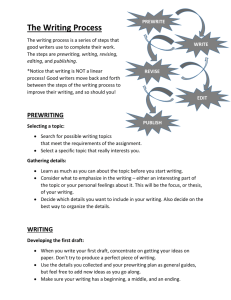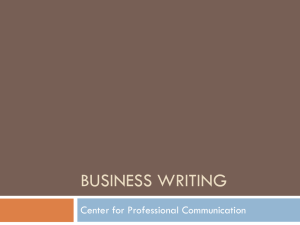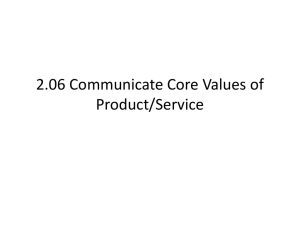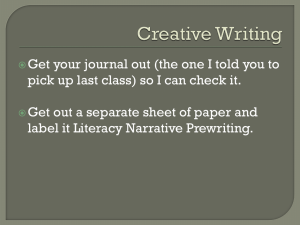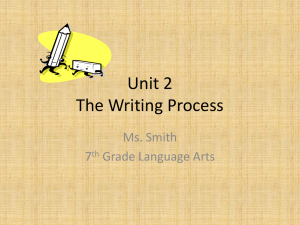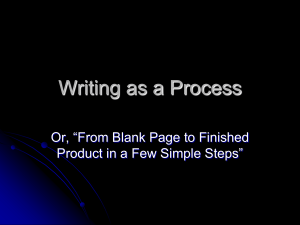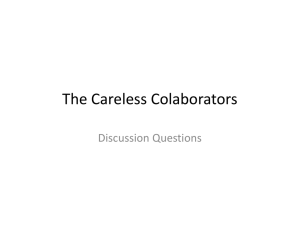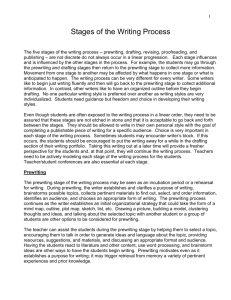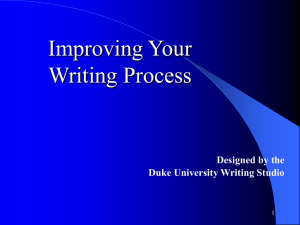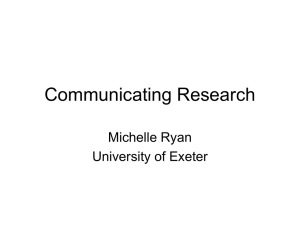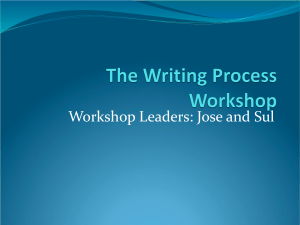Chapter 4x
advertisement
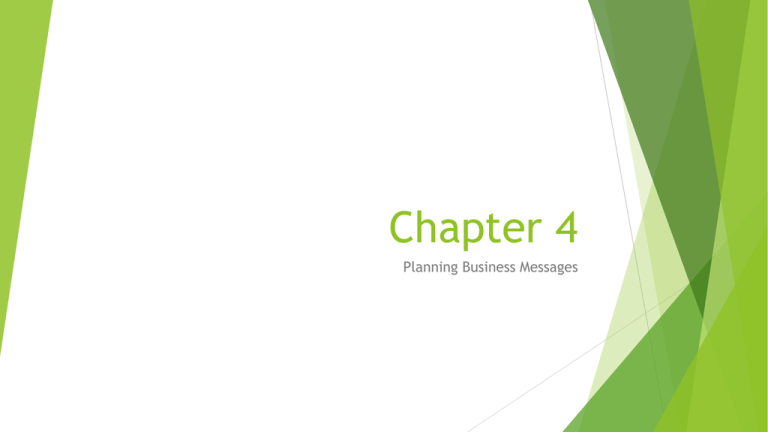
Chapter 4 Planning Business Messages Chapter 4 Three Phases of Writing Prewriting Writing Revising Chapter 4 Prewriting What is your purpose? Analyze your audience How will your audience react? Chapter 4 Writing Researching information Organizing information Writing the message Chapter 4 Revising Revising Proofreading Evaluating Chapter 4 Audiences to Consider Colleagues Superiors and decision makers Customers and clients Chapter 4 Choosing the Channel How important is the message? How much feedback is required? How fast is feedback needed? Is a permanent record necessary? How much can be spent? How formal is the message? How sensitive or confidential is the message Chapter 4 Media Richness Theory Describes the extent to which a channel or medium recreates or represents all the information available in the original message Specifies that a richer medium, such as face-to-face conversation, permits more interactivity and feedback Specifies that a leaner medium, such as a report proposal, presents a flat, onedimensional message Specifies that richer media enable the sender to provide more verbal and visual cues and allow the sender to tailor the message Chapter 4 Choosing Communication Channels Letter Memo E-mail Fax Phone call Face-to-face conversation Face-to-face group meeting Report or proposal Audio or video conference Chapter 4 Techniques to Create a Positive Tone Spotlight audience benefits Cultivate the “you view” Your report was well written, not Your report was totally awesome. Express thoughts positively Your account is now open. Be conversational but professional The warranty starts working for you immediately. You will be happy to. . ., not You won’t be sorry that. . . Be courteous Please complete the report, not You must complete the report. Chapter 4 Techniques to Create a Positive Tone Use language free of gender, race, age, and disability biases Use plain language and familiar words office workers, not office girls Use salary, not remuneration Employ precise, vigorous words fax me, not contact me Chapter 4 Developing Reader Benefits and the “You” View Sender-focused? We are requiring all staffers to complete these forms in compliance with company policy. Because we need more space for our new inventory, we are having a two-for-one sale. Receiver-focused Please complete these forms so that you will be eligible for health and dental benefits. This two-for-one sale enables you to buy a year’s supply of paper but pay only for six months’ worth. Chapter 4 Developing Reader Benefits and the “You” View “I” and “We” View We take pleasure in announcing an agreement we made with HP to allow us to offer discounted printers in the bookstore. “You” View An agreement with HP allows you and other students to buy discounted printers at the bookstore. Chapter 4 Developing Reader Benefits and the “You” View “I” and “We” View We are issuing a refund. I have a few questions on which I would like feedback. “You” View You will receive a refund. Because your feedback is important, please answer a few questions. Chapter 4 Negative Expressions and their Hidden Messages You overlooked (You are careless) You state that (I don’t believe you) You failed to (You are careless) You claim that (It is probably untrue) You are wrong (I am right) You do not understand (You are not very bright) Your delay (You are at fault) You forgot to (Besides being inefficient, you are stupid and careless) Chapter 4 When is Team Writing Necessary? When projects are larger than one person can handle When projects have short deadlines When projects require the expertise or consensus of many people Chapter 4 Three Phases of Team Writing Prewriting Writing Revising Chapter 4 Legal and Ethical Responsibilities When communicating investment information, avoid misleading information, exaggeration, and half truths. When communicating safety information, warn consumers of risks in clear, simple language. When communicating marketing information, avoid statements that falsely advertise prices, performance capability, quality, or other product characteristics. When communicating human resources information Avoid subjective statements in evaluating employees; describe job-related specifics objectively. Avoid promissory statements in writing job ads, application forms, and offer letters. Chapter 4 Legal and Ethical Responsibilities Assume that everything is copyrighted Understand that Internet items are NOT in the public domain Observe fair use restrictions Ask for permission Don’t assume that a footnote is all that is needed
